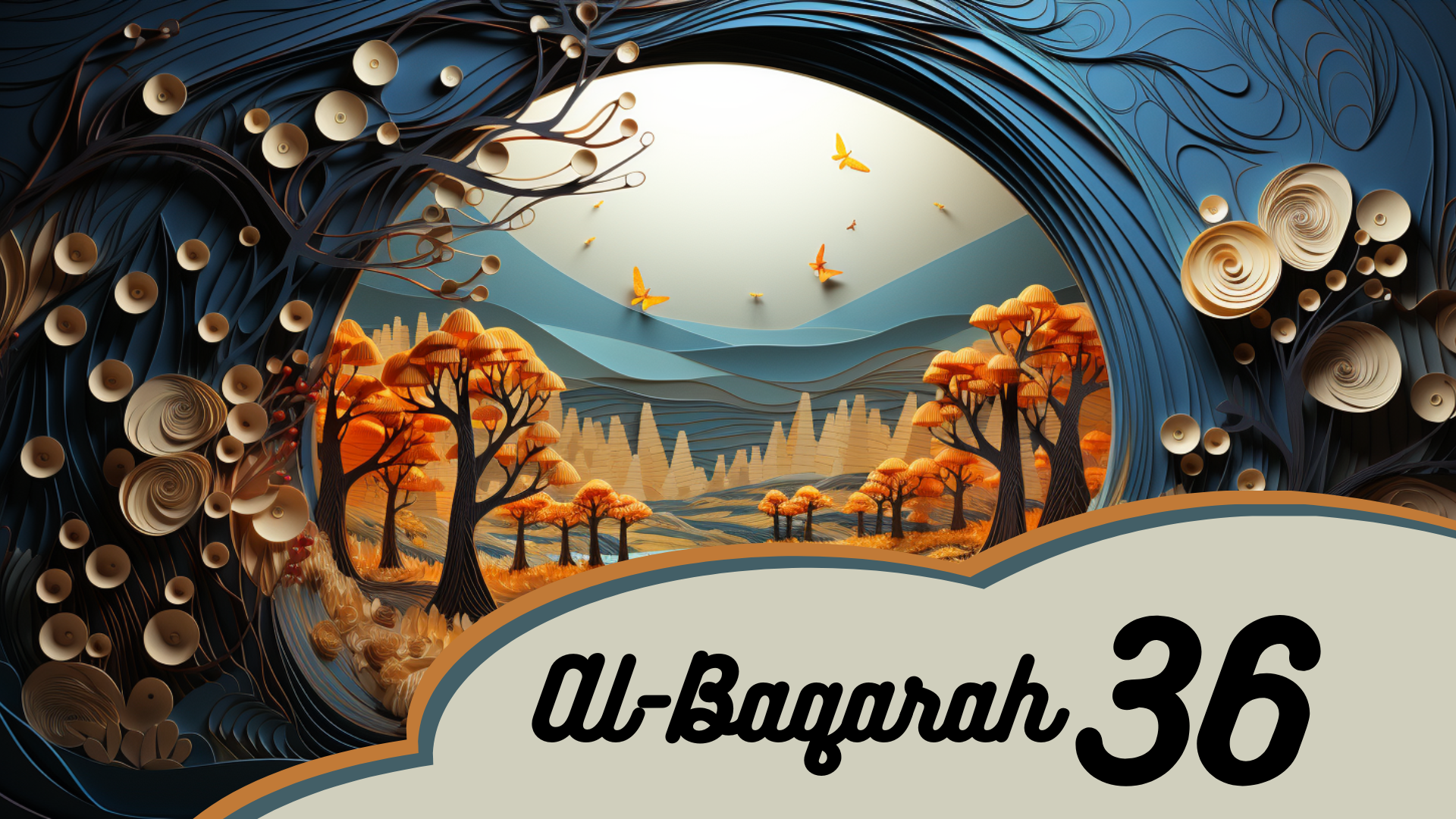In this article, we explore the meaning and significance of Verse 36 of Surah Al-Baqarah in the daily lives of Muslims. Surah Al-Baqarah is a chapter in the Quran that holds great importance, and understanding the messages conveyed in its verses is essential. We delve into the detailed explanation of Verse 36, providing insights into its application and relevance to the lives of believers. By examining this verse, we aim to deepen our understanding of the Quran and its impact on our spiritual journeys.
Verse 36 of Surah Al-Baqarah
Context
Surah Al-Baqarah, also known as “The Cow,” is the second chapter of the Quran and holds great importance in the lives of Muslims. It consists of 286 verses and covers various themes, including the stories of previous prophets, legal rulings, and moral guidance. The context of verse 36 is crucial to understanding its significance and implications in daily life.
Translation
The verse is translated as follows: “Then Satan caused them to slip, and they, Adam and Eve, were expelled from Paradise. And We said: ‘Get down, one of you an enemy to the other. There shall be for you on earth a dwelling place and provision for a time.'”
Significance
Verse 36 of Surah Al-Baqarah has great significance as it recounts the story of Adam and Eve’s expulsion from Paradise after succumbing to Satan’s deception. It delves into the consequences of their actions, both in the immediate and long-term sense. This verse serves as a reminder of the frailty of human beings, the consequences of disobedience to God’s commands, and the constant struggle between good and evil.
Explanation
The verse begins with the admission that Satan, the deceiver, caused Adam and Eve to slip from the obedience and purity they were enjoying in Paradise. Their disobedience led to their expulsion from Paradise. As a result, they were separated from the bounties and tranquillity of Paradise and were sent down to Earth. This earthly abode would serve as their new dwelling place and a temporary provision for their needs.
Historical Background
The story of Adam and Eve’s creation, their life in Paradise, and their subsequent expulsion from it is a well-known narrative mentioned in the Quran and other religious traditions. According to Islamic teachings, Allah created Adam (the first human) and placed him in Paradise. Adam and Eve were given free will but were forbidden from eating the fruit of a specific tree. Satan, in his arrogance and jealousy, deceived them and convinced them to disobey Allah’s command. As a result, they were banished from Paradise and sent to Earth.
Application in Daily Life
This verse holds valuable lessons for Muslims that can be applied in their daily lives. It serves as a reminder that human beings are prone to make mistakes and that one must constantly be vigilant against the whispers of Satan. It emphasizes the importance of obedience to Allah’s commands and the consequence of disregarding them. Muslims should use this story as a motivation to seek forgiveness for their sins and strive to improve their relationship with Allah.
Lessons from the Verse
Verse 36 teaches us several important lessons. Firstly, it highlights the power of Satan’s deception and manipulation. It shows that even the most righteous and close to God can be influenced by evil if they let their guard down. This warns us to always be aware of Satan’s tactics and to seek refuge in Allah from his whispers.
Secondly, the verse stresses the concept of individual responsibility. Adam and Eve were individually held accountable for their actions, despite being influenced by Satan. This teaches us that in matters of obedience and sin, each person bears the responsibility for their own choices. We cannot blame others or external factors for our own mistakes.
Thirdly, the verse emphasizes the transient nature of this worldly life. Adam and Eve were expelled from Paradise and sent to Earth as a temporary dwelling place. This reminds us that our time on Earth is finite and that we should focus on utilizing it to seek closeness to Allah and to do good deeds.
Interpretations
Verse 36 of Surah Al-Baqarah has been interpreted by scholars and theologians throughout history. One interpretation suggests that Adam and Eve’s expulsion from Paradise symbolizes the fall of humanity. It represents the potential for human beings to succumb to temptations and disobey God’s commands. This interpretation underscores the importance of repentance and seeking forgiveness from Allah to regain His divine favour.
Another interpretation looks at the enmity between humans that arose after their expulsion as a metaphorical representation of the perpetual struggle between good and evil. This struggle manifests itself in various forms, such as conflicts between individuals, communities, and nations. The verse serves as a reminder to Muslims to strive towards righteousness and to unite against evil in all its forms.
Scholarly Opinions
Scholars have offered various views on verse 36 of Surah Al-Baqarah. Ibn Kathir, a renowned Islamic scholar, explains that Allah’s command to Adam and Eve to descend to Earth was not a punishment but a preordained plan. It was a necessary step for human beings to fulfil their ultimate purpose, which is to worship and obey Allah.
Another scholar, Imam Al-Qurtubi, highlights the wisdom behind Adam and Eve’s expulsion. He states that their time on Earth would serve as a test and a means for them to prove their devotion to Allah. It would be an opportunity for them to repent, seek forgiveness, and ultimately return to a higher level of Paradise.
Conclusion
Verse 36 of Surah Al-Baqarah holds profound meaning and relevance in the lives of Muslims. It reminds them of the consequences of disobedience and the perpetual struggle between good and evil. The story of Adam and Eve serves as a cautionary tale, urging believers to be mindful of Satan’s deception and to strive for righteousness. Muslim individuals can apply the lessons from this verse in their daily lives by seeking forgiveness, taking responsibility for their actions, and constantly striving to improve their relationship with Allah.




